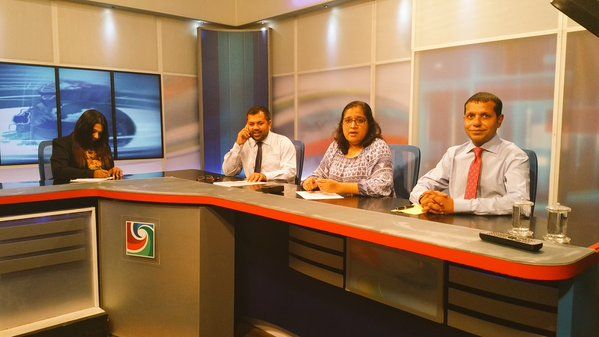TVM launches English talk show to counter Nasheed’s media blitz
Top government officials appeared last night in the Maldives public broadcaster’s first-ever English talk show to dismiss former President Mohamed Nasheed’s damning comments on rising terrorist recruitment and call for targeted sanctions.

28 Jan 2016, 09:00
Top government officials appeared last night in the Maldives public broadcaster’s first-ever English talk show to dismiss former President Mohamed Nasheed’s damning comments on terrorist recruitment in the Maldives and call for targeted sanctions.
Nasheed, who was temporarily freed from jail last week, has made international headlines since his arrival in London, angering the government, which has since labeled his 30-day medical leave as “media-leave.”
During the first episode of Television Maldives’ Talk Maldives, Tourism Minister Moosa Zameer acknowledged the damage wrought by Nasheed’s comments and sought to portray him as an economic threat, while Azima Shakoor, the newly appointed minister for legal affairs, downplayed the risk of terrorism, insisting that only 35 Maldivians, and not 200, had left the Maldives to fight in the Middle East.
Amidst leading questions by the show’s host, Nasheed’s heavyweight international lawyers – Jared Genser, founder of renowned campaign group for political prisoners, Amal Clooney, wife of actor George, and Ben Emmerson, a UN rights expert – were accused of being irresponsible and spreading “blatant lies” to further their own celebrity agenda.
Become a member
Get full access to our archive and personalise your experience.
Already a member?
Discussion
No comments yet. Be the first to share your thoughts!
No comments yet. Be the first to join the conversation!
Join the Conversation
Sign in to share your thoughts under an alias and take part in the discussion. Independent journalism thrives on open, respectful debate — your voice matters.




